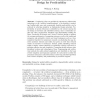Free Online Productivity Tools
i2Speak
i2Symbol
i2OCR
iTex2Img
iWeb2Print
iWeb2Shot
i2Type
iPdf2Split
iPdf2Merge
i2Bopomofo
i2Arabic
i2Style
i2Image
i2PDF
iLatex2Rtf
Sci2ools
107
click to vote
DAGSTUHL
2004
2004
Simplicity Considered Fundamental to Design for Predictability
Complexity is the core problem of contemporary information technology, as the "artificial complicatedness" of its artefacts is exploding. Intellectually easy and economically feasible predictability can be achieved by selecting simplicity as fundamental design principle. Predictability of system behaviour is identified as the central concept for the design of real-time and embedded systems, since it essentially implies the other requirements timeliness and dependability holding for them. Practically all dynamic and "virtual" features aiming to enhance the average performance of computing systems as well as the traditional categories and optimality criteria are found inadequate and are, thus, considered harmful. In mainstream research on scheduling the gap between academic research and reality has grown so wide that research results are doomed to irrelevance. Instead, useful scheduling research ought to employ utmost simplicity as optimality criterion, and strive to ...
Related Content
| Added | 30 Oct 2010 |
| Updated | 30 Oct 2010 |
| Type | Conference |
| Year | 2004 |
| Where | DAGSTUHL |
| Authors | Wolfgang A. Halang |
Comments (0)

